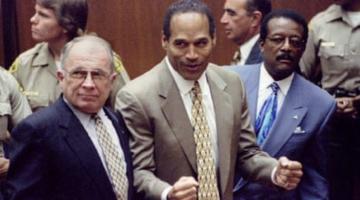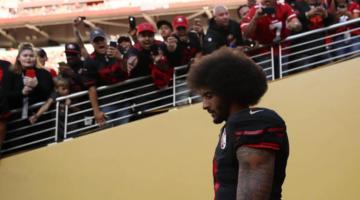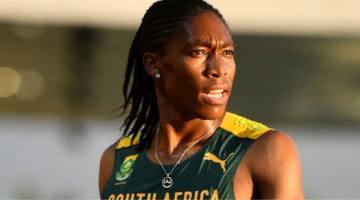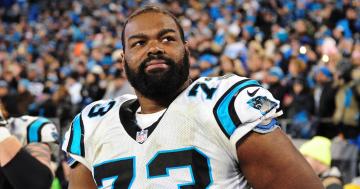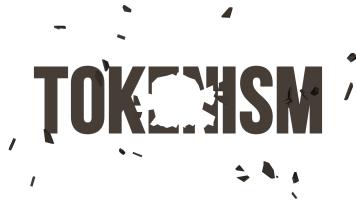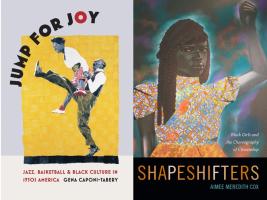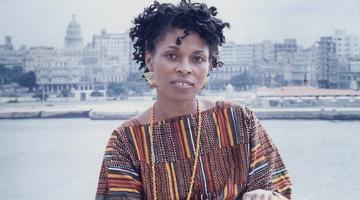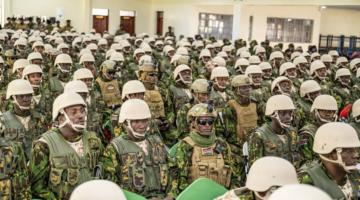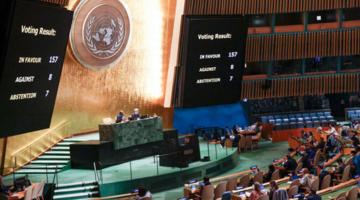This week, we interview Samantha N. Sheppard. Samantha N. Sheppard is an associate professor of cinema and media studies in the Department of Performing and Media Arts at Cornell University. She is the author of Sporting Blackness: Race, Embodiment, and Critical Muscle Memory on Screen (University of California Press, 2020). In 2021, she was named an Academy Film Scholar by the Academy of Motion Picture Arts and Sciences.
What sports headline or controversy is grabbing your attention these days?
There have been a spate of sports headlines and controversies that have grabbed my attention this year. In the last few months, I have felt inundated with sports news that relates to issues of race. This feeling is, of course, largely because two major sporting events have recently occurred: Super Bowl LVI and the 2022 Winter Olympic Games in Beijing. With the Super Bowl LVI, I was struck by the juxtaposition of the widely praised half-time show on social media with the recent news of Brian Flores’ lawsuit against the NFL for discriminatory hiring practices. Dr. Dre, who headlined the performance alongside Snoop Dogg, Mary J. Blige, Eminem, Kendrick Lamar, and others, described the half-time program as an “unforgettable cultural moment,” which it certainly was in terms of its production, performers, and LA inflections. However, his statement highlights how “forgetting” and “remembering” operates in sporting narratives. As people praised the genius of Black culture and performance displayed in the musical program, they also obscured the ways in which inequity and exploitation shapes the commodification of Black labor and performance on and off the field. The question then becomes: in remembering this “unforgettable cultural moment” what and who are we forgetting? Brian Flores? CTE? Colin Kaepernick?
The other controversy that grabbed my attention was the story of the International Olympic Committee’s (IOC) treatment of Russian figure skater Kamila Valieva, who was permitted to compete in the Games (and came in fourth place) despite failing a doping test. As we can recall, American sprinter Sha’Carri Richardson was banned from competing in the 2020 Summer Games in Tokyo for testing positive for marijuana. On social media, Richardson wrote: “Can we get a solid answer on the difference of her situation and mines? My mother died and I can’t run and was also favored to place top 3. The only difference I see is I’m a black young lady.” Richardson’s post is both a reminder and indictment of the deeply racialized and punitive was in which the IOC has historically treated Black athletes.
You recently wrote an article titled “Glorious Bones: Esmaa Mohamoud’s Football Fabulation.” Can you please share a little about Esmaa Mohamoud and why you find her work so important?
Esmaa Mohamoud is a brilliant African Canadian multidisciplinary artist. Her artistic mediums include photography, sculpture, installation, and performance. As Mohamoud describes explicitly, her “work investigates Black body politics, depicting aesthetically the paradoxes of Blackness, its hypervisibility and invisibility, concerning herself with the ways in which racialized bodies navigate spaces as figures where complex gender and racial dynamics are confronted, performed and reimagined.” Sports—specifically basketball and football—figure largely in her work, and Mohamoud visually renders how individuals and institutions contest and play out issues of race, gender, and belonging on and off the field/court.
Personally, I have been a fan of Mohamoud and her work for a while now since a colleague shared images of one of her exhibitions in Toronto. I found her work absolutely stunning, proactive, and resonant, especially as I was working on my book on race and sports films. I was especially grateful when she granted me the honor of using her photograph, “Untitled, No Fields,” for the cover of my Sporting Blackness: Race, Embodiment, and Critical Muscle Memory. While I felt that image most aptly and beautifully captured the themes of the book, I have also been drawn to her other works that entangle sports and cinema histories. Specifically, her installations “Heavy, Heavy (Hoop Dreams)” references the film Hoop Dreams (Steve James, 1994) and, as the article you mentioned from The Velvet Light Trap, her installation “Glorious Bones” references Remember the Titans (Boaz Yakin, 2000). With “Heavy, Heavy (Hoop Dreams),” Mohamoud constructed an installation of sixty solid concrete basketballs in various states of deflation that weigh thirty pounds each. The work references the documentary Hoop Dreams’ documentary protagonists’ Arthur Agee and William Gates’ deflated dreams of making it to the NBA. I love her attention to sporting specificity, evidenced in the fact that the sixty balls represent the number of players in NBA draft’s two-rounds. As I explain in my article “Glorious Bones: Esmaa Mohamoud’s Football Fabulation,” this installation gestures towards the racialized histories of osteology. There are forty-six football helmets adorned in African textiles mounted atop hot-rolled steel with scattered earth covering the base of the gallery floor. The display is surrounded by a quote from a scene in Remember the Titans about the Battle of Gettysburg, and the juxtaposition of the helmets and the quotation highlights the ideological contradictions and racial dynamics in sports and sports cinema.
How does your article on Esmaa Mohamoud connect to your larger research interests around sports cinema, feminist media studies, and Black cultural production?
My article on Mohamoud’s “Glorious Bones” in an extension of my work examining representations of sporting blackness. As I explore in my book and subsequent projects on sports media, I am interested in thinking through what it means to “sport blackness” as a implicit and explicit challenge to media and sports culture. Mohamoud’s work, like many of the sports films and media I engage in my research, provides an occasion to consider the production, consumption, and circulation of blackness in visual culture. While I have not written about Mohamoud’s “One of the Boys,” a collaborative work she did with Qendrim Hoti that features men and women wearing Raptors’ jerseys as ball gowns, I think this series visually addresses how I think through the gendered aspects of sporting blackness. In my book Sporting Blackness, I have a chapter dedicated to the examination of gendered sporting blackness. Drawing on Judith Butler’s notion of athletic genders, I consider how racialized femininities and masculinities are sporting acts of social fictions about bodily comportment and ideals. Mohamod and Hoti’s series delves into these issues, provocatively unsettling how athletic genders are designed and constructed in ways that push on gendered norms, conventions, and expectation. As I continue to write on sports media and visual culture, I want to continue to think about the visual economy of sports and the intersections of social identities.
How did you become interested in studying race, sports, and politics?
I think I kind of both fell into studying race, sports, and politics and also have been studying it all my life. I am a former athlete who has thought a lot about my own blackness in relationship to sporting cultures, communities, and institutions. However, my formal study of race, sports, and politics originates less from my own athleticism and more from my interest in studying Black embodiment in film. As a cinema and media scholar, I wanted to examine representations of Black bodies in motion and contest on screen. The sports genre, which is a largely untheorized genre, seemed like a great arena to unpack the histories, narratives, and representational politics of blackness in American sports and cinema. In studying sports movies, I wanted to also really understand how blackness animates sports in general. Broadening my interest to the fields of sports studies—specifically history, sociology, and literary/memoir—I began to understand how sports systems operate on large, small, literal, and mythic scales.
Which books have most impacted the way you theorize about sports and Black struggle?
There have been so many books and authors who have given me vital language, histories, and perspectives to theorize the racialization of sports and understand Black struggle on- and off-screen. The books outside of my field of cinema and media studies that have been most impactful include: Ben Carrington’s touchstone Race, Sport and Politics: The Sporting Black Diaspora (Sage, 2010); Kareem Abdul-Jabbar’s resonant On the Shoulders of Giants: My Journey Through the Harlem Renaissance (Simon and Schuster, 2007); Amy Bass’s rigorous Not the Triumph but the Struggle: The 1968 Olympics and the Making of the Black Athlete (University of Minnesota Press, 2002); Dave Zirin’s evocative A People’s History of Sports in the United States: 250 Years of Politics, Protest, People, and Play (The New Press, 2008); Harvey Young’s brilliant Embodying Black Experience: Stillness, Critical Memory, and the Black Body (University of Michigan Press, 2010) and Amira Rose Davis’s stunning “No League of Their Own: Baseball, Black Women, and the Politics of Representation” in Radical History Review. All of these authors have shaped my knowledge of Black athleticism, reminding me of the importance of framing, historicizing, and theorizing how race intersects with sports in distinct and distinguishing ways.
Roberto Sirvent is editor of the Black Agenda Report Book Forum.

